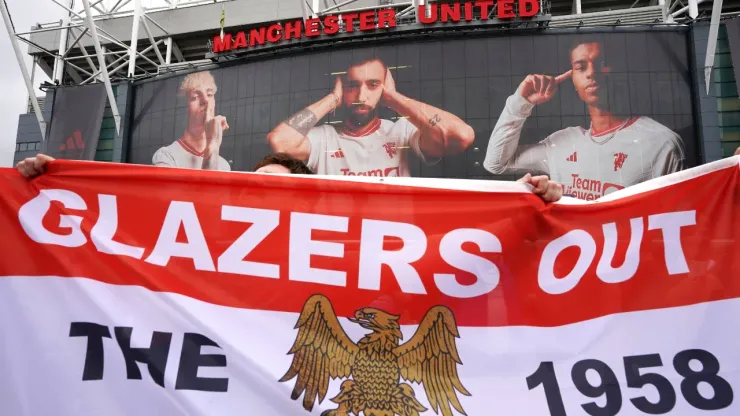Big spending led to big expectations for Manchester United since the Sir Alex Ferguson era. Couple that with everything the Scot achieved at Old Trafford, and the spotlight on players at Manchester United is brighter than any other club in England. However, the one thing weighing this club down remains the ownership. The Glazer family is the one responsible for Manchester United’s consistent struggles.
Stefan Szymanski, a professor of sport management at the University of Michigan and the author of Soccernomics, says the problem with Manchester United is the quality of management.
“The obvious thing in the case of Manchester United is the quality of the management. And I do not necessarily mean the quality of the coaches, I mean the quality of the organization as a whole,” Szymanski said. “This is an organization where they have managed to make themselves utterly hated by the people they depend on for their income.”
Manchester United has become the model for how not to treat a fan base. There are regular protests at Old Trafford against the American ownership of the club. For example, during the 2020 campaign, supporters stormed into Old Trafford before a game.
Szymanski says this hatred toward the ownership prevents the club from making the right hire. In his eyes, Manchester United’s volatile atmosphere may push away ambitious managers or coaches looking to take the next step in their careers.
“Maybe the problem is not on the pitch with the players, maybe it is more about the internal management,” Szymanski said. “Maybe it is the fact that knowing everybody hates the owners of the team that affects the players as well.”
Glazers breed consistent struggles at Manchester United
The only reason Manchester United put up with the Glazers beforehand was because of Ferguson’s success. United won the lot with the Scot at the helm. His ability to manage his players and effectively control what they did allowed them to handle any outside pressure. That is a rare talent that few coaches have, and Manchester United was the beneficiary of his talent. Without that presence, United’s players faced the scrutiny from supporters head-on.
“In the aftermath of his departure, it is a toxic environment,” Szymanski said. “It is hard to do your best. You’re thinking about all the problems, you’re thinking about what’s right and wrong. You’re getting distracted by the talks of politics. All of these things are having a negative effect. If it is not bad luck, it has as much to do with the quality of ownership of the club.”
Manchester United supporters are then in the precarious situation of both wanting success and wanting change.
“If the team failing would get rid of the Glazers, would they like that? Yes.”
Yet, these fans also want success. Paying for tickets to games and buying merchandise help keep the club afloat. Manchester United fans organized sit-ins where supporters protested the club’s ownership after games. The Glazers and their technical staff are there to sell a product. That product is success on the field, and it can bring in billions for the club.
Unlucky transfers
Much of those billions go back into the club via transfers. Szymanski alluded to luck, which plays a role in how well transfers pan out. Szymanski argues having the Class of ’92 and Cristiano Ronaldo, Eric Cantona and Wayne Rooney work so well over the years set too high of a standard. The recent struggles of Manchester United under the Glazers have not been happening for that long in the grand scheme of soccer.
Like other clubs, Manchester United must pick out a handful of players who can become world-class talents. To shorten it, United went to players that had already been proven at other clubs or leagues. Harry Maguire was a great center-back at Hull City and Leicester City. Jadon Sancho was a key component of some great Borussia Dortmund teams. Paul Pogba was in the UEFA Team of the Season in the 2014/15 campaign.
“The ability of individuals is pretty much known by everybody,” Szymanski said. “Unlike a lot of markets where you do not know what you are getting, it is a much more reliable market.”
Perhaps United, in addition to the toxic atmosphere, has been suffering from a string of bad luck in that market. These things will pass, as Szymanski notes this decade of struggles with the Glazers in charge is nothing in the grand scheme of the history of Manchester United. Perhaps it only seems worse than it is because United’s peak was so high. Regardless, the club may need a change in culture to return to that level of success.
Photo: Imago
200+ Channels With Sports & News
- Starting price: $33/mo. for fubo Latino Package
- Watch Premier League, Women’s World Cup, Euro 2024 & Gold Cup
The New Home of MLS
- Price: $14.99/mo. for MLS Season Pass
- Watch every MLS game including playoffs & Leagues Cup
Many Sports & ESPN Originals
- Price: $10.99/mo. (or get ESPN+, Hulu & Disney+ for $14.99/mo.)
- Features Bundesliga, LaLiga, Championship, & FA Cup
2,000+ soccer games per year
- Price: $5.99/mo
- Features Champions League, Serie A, Europa League & Brasileirāo
175 Premier League Games & PL TV
- Starting price: $5.99/mo. for Peacock Premium
- Watch 175 exclusive EPL games per season






